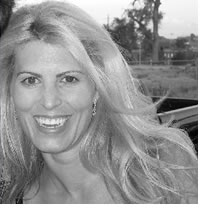Do you ever take your eyes off the copy? You’re invited to be a fly on the wall during one of Nancy Wolfson’s private voice over coaching sessions that leads to a great discovery. Find out what happens when you drop the copy and also learn more about what you can do to prevent vocal performance errors when recording a voice over.
Links from today’s show:
Braintracks Audio
Break Into Voiceover
Your Instructor this week:
Voice Over Expert Nancy Wolfson Nancy Wolfson
Nancy Wolfson
Based in Los Angeles, CA Nancy Wolfson is a private voice over consultant and freelance casting director for commercials, animation, narration, and audio books. She writes, produces, and directs demos for her clients and has been the leading coach in the top market(s) over a decade. Her coursework has been accredited at the university level in private and group classes throughout North America and Europe. For over 15 years, she has worked with beginners, working pros, and celebrities as a producer and talent agent.
Julia-Ann Dean: Welcome to Voice Over Experts brought to you by voices.com, the number one voiceover marketplace. Voice Over Experts brings you tips, pearls of wisdom, and techniques from top instructors, authors, and performers in the field of voiceover. Join us each week to discover tricks of the trade that will help you to develop your craft and prosper as a career voiceover talent. It’s never been easier to learn, perform, and succeed from the privacy of your own home and at your own pace. This is truly an education you won’t find anywhere else.
This week, voices.com is pleased to present Nancy Wolfson.
Bruce: I’m taking it from the top here.
Nancy Wolfson: I’m not understanding why you’ve stumbled so much.
Bruce: Um. Yeah.
Nancy Wolfson: Because I don’t think you’re a stumbler.
Bruce: There’s a —
Nancy Wolfson: That thing, that passive aggressively, seriously.
Bruce: There’s a —
Nancy Wolfson: Like I feel like if I hung up the phone and you went into the bathroom with a magazine, you could read an article out of the magazine with almost no stumbling.
Bruce: Okay.
Nancy Wolfson: What’s happening? Like they don’t see you as a stumbler, but you have a bear of a time getting some copy.
Bruce: Sometimes I–I like to take my eyes off of the copy and like —
Nancy Wolfson: I’m so glad you’re telling me this. Why on earth would you do that?
Bruce: To kind of get into the situation.
Nancy Wolfson: Oh, it’s terrible. Don’t — I’m so glad you told me that. I’m so glad you’re aware of the fact that you’re doing that.
Bruce: Okay.
Nancy Wolfson: Cut that out.
Bruce: Okay.
Nancy Wolfson: Because it’s killing you. What are you doing with you dropping your hand on a piece of a paper, people do it all the time. There’s no reason why some of these things are taking us eleven passes to get through it. And by the way, something guys about you’re bigger for the thing after about the third take, I knew there was something in there that didn’t make any sense. Why on earth in a spoken word of performance would you not take advantage of the fact that it’s an open book exam? You’re getting judged on how well you read off of that piece of paper and make it sound spontaneous and then you’re crippling the process by taking your eyes off the piece of paper. What are you, a mind reader? Don’t do that to yourself because that’s what makes your acting sound like the commitment to being in character would fall off the balance beam and have to find its way back on to the balance beam. Well why? Because you’re taking your eyes off the piece of paper.
Bruce: Yeah.
Nancy Wolfson: It’s not helping your acting that’s for damn sure and it’s making you sound like you can’t talk, and it’s also making it sound like your commitment to being in character was focus constantly. I’m so glad you’re that aware of your own physiology in what’s going on because that could have taken us a lot of time and money to figure out. Okay, what’s happening is that you’re trying to get more spontaneous for a second and not sound so reedy, I think that’s a good intention. And you drop the piece of paper, your eyes lose place on the page, you say 88 instead of 888, you don’t say all at the end of the sentence, you skip a word that’s critical for meaning in the sentence, your eyeballs are not taking a good snatch out of the words that come in a way that would allow your brain to just read off the picture in your head, it’s skipping words, you’re dropping words, you’re losing your emotional place, and then you’re losing your physical place on the piece of paper unable to find it and by that time you’ve dropped your acting.
All of this to say, you were doing yourself no favor of creating spontaneity for what you’re losing in terms of stumbling and acting clips. I’m so glad you’re aware that you were doing that because a lot of people aren’t aware that they’re doing it. You know, they feel like I’m just going to kind of — I get it, I get it, I kind of et get what this line is doing and I’m going to go kind of like off book for a second while I try to be more spontaneous because I’m self-conscious that I’m announcery.
Yeah, but if you don’t take perfect snapshot of the words that are to come, you’re going to skip words, stumble words, lose your moment and that’s exactly what’s been happening. I’m so glad I asked this. You never struck me as a stumbler and I could not figure out why you were not reading the words that are right there in front of you. Why? Because they’re not right there in front of you.
Bruce: Well —
Nancy Wolfson: Very understandable, a lot of people do that.
Bruce: Okay. I don’t put my hand in front, I just kind of look up from it and —
Nancy Wolfson: Yeah, you can’t do that.
Bruce: — get into the moment.
Nancy Wolfson: Why would you do that?
Bruce: Um.
Nancy Wolfson: It’s there to be read.
Bruce: Yeah. You nailed it. It’s trying to be a little more spontaneous and put it more into my imagination and come from there than get ready off the page.
Nancy Wolfson: But it’s not improv.
Bruce: And if it’s not working then it’s not working.
Nancy Wolfson: Well, it’s not improv and you don’t have a photographic memory. You know?
Bruce: No, I’m not trying to justify them, I’m just telling you–
Nancy Wolfson: No. No. Well I asked you a question and you’re actually answering it, but like here’s why it doesn’t work. It — you could maybe do that in other areas of acting, okay. But this isn’t improv, it’s reading off that piece of paper for a living. It’s voiceover. And they don’t want you to improvise really especially that [0:05:12] [Indiscernible]. Right?
[0:05:14]
Bruce: Right.
Nancy Wolfson: It’s not improv and you Bruce do not have a photographic memory. You don’t get to do that.
Bruce: I guess I’ve proved that.
Nancy Wolfson: Yeah. And so where’s the win?
Bruce: Yeah.
Nancy Wolfson: There’s no been no win. And you’re only making it harder on yourself. You know, it’s an open book exam, take advantage. Don’t keep closing the notebook. No one else is going to be able to give you any extra credit for working off book because we assume you’re working on books and now all you’re sounding is clunky.
Bruce: Right.
Nancy Wolfson: Now — when we imagine, you know what I mean? We imagine that your eyes are on that page and you just can’t take things into your eyes and out of your mouth very well and you’re going oh, no, no, I moved my eyes off the page. Do you know what I mean?
Bruce: Okay.
Nancy Wolfson: It doesn’t add any kind of spontaneity that is winning you anything compared to how much you lose in the stumble than bad acting that comes. And even frankly, if you didn’t stumble as a result of doing that and your emotional state didn’t start having to do 13 unnecessary things that wants to like remember words in addition to stay in the mood, I just — why cripple yourself. It’s not worth it. Yeah.
Okay. So all of that rambling to say, keep your eyes on the paper.
Julia-Ann Dean: To learn more about the special guest featured in this Voices.com podcast, visit the Voice Over Experts show notes at podcast.voices.com/voiceoverexperts. Remember to stay subscribed. If you’re a first time listener, you can subscribe for free to this podcast in the Apple iTunes podcast directory or by visiting podcasts.voices.com. To start your voiceover career online, go to voices.com and register for a voice talent membership today.



Comments
so does he need to keep his eye on the copy? I might have missed the solution>>> lol…clear as a freshly cleaned glass actually….discoveries when they are least expected are sometimes golden. …annnnd since I am being cliche and not adding anything brilliant here…I will stop~
Wow! This podcast neatly packages what happens when we take our eyes off the script. I was definitely guilty of this when I first started, particularly before I understood the differences between stage acting and voice acting. Having a teacher point it out early on was a lifesaver, especially after hearing the specific implications detailed here. Thanks for sharing.
Boy, did I squirm! Terrifying!
Ouch and thanks! I needed this podcast!
WOW!
Yeah … take your lumps … a little pain now will pay big later. She has no fear of the “artist’s ego” does she. lol … that’s one of the signs of a good coach. Hopefully she’s as good at building up and encouraging as she is at ripping into someone.
I’m new to the business trying to expand my horizons and do more work in this industry.Im so glad I read this info as I’m a backround actor looking to explore all avenues of work by applying myself as a voice talent. Now I know that when your doing voiceover work to keep my eyes on the paper unlike Tv//stage acting where its ok to do improv,you don’t do that with voiceover work.Now I’m better prepared to tackle an audition
in a more professional manner or I will at least portray my part better than if I wasn’t informed.great scenario thank you!!!
This is Nancy at her best!! Love it! Her coaching is worth every penny…just suck it up and invite every bit of constructive criticism she offers….that is invaluable for growing vo skills.